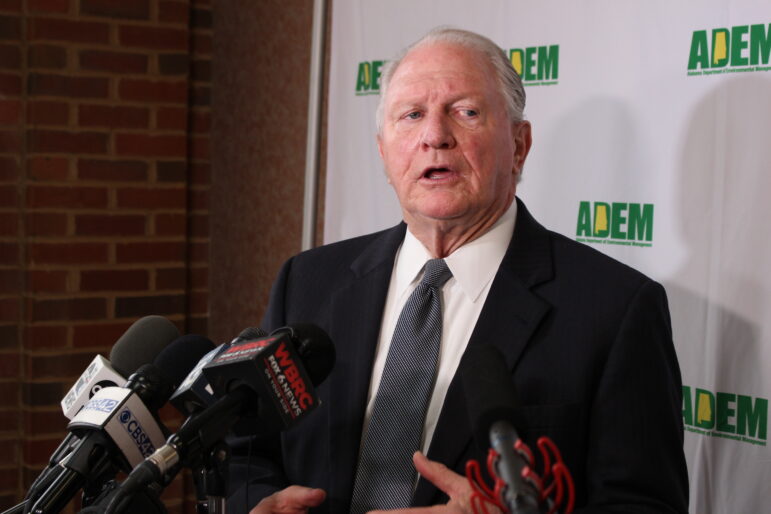Environmental advocates heaped criticism on state regulators during the Alabama Environmental Management Commission’s meeting in Montgomery Friday over their response to a landfill fire near Moody, which has been burning for more than two months. Speakers at the meeting argued the Alabama Department of Environmental Management took too long to act on the fire and that steps must be taken to regulate these types of landfills.
“The Moody landfill fire is actually a great highlight to see where there are a lot of gaps in ADEM’s execution. … I think for there to be gaps in the law is oversight on the commission’s part and I think the residents are suffering,” said Sidni Elise Smith, a staff attorney of the Greater-Birmingham Alliance to Stop Pollution (GASP).
Smith said that ADEM failed to regulate, enforce, manage and respond to the hazards at the Environmental Landfill, Inc. site, which caught fire in late November. The landfill is unregulated because it is only supposed to take in green waste such as trees. However, inspections prompted by complaints have found unauthorized waste at the landfill. The U.S. Environmental Protection Agency took the lead in extinguishing the fire in mid-January, but not before weeks of bureaucratic back-and-forth between county and state leaders.
Smith told the commission that they needed to advise ADEM to regulate green waste because, she said, it is part of the definition of solid waste, which is under the state’s jurisdiction.
“It’s not just about extinguishing the fire. We get that that’s a priority for ADEM … but there are going to be long-term impacts as well, and that’s something that we’re looking for to see improved on legislatively, long-term, through the laws and policies and regulations,” Smith said.
David Ludder, a lawyer representing the Environmental Defence Alliance, also argued that ADEM should have been regulating environmental waste from the beginning. He says that state law defines solid waste as a discarded material.
“And so if you look at the dictionary definitions of discarded and material, that would certainly cover a green waste. It’s a material and it’s discarded. So therefore, it’s a solid waste. All solid waste has to be disposed of in a permitted landfill,” Ludder said.
If ADEM had permitted Environmental Landfill, the business would have had stricter requirements to operate that may have prevented the fire from breaking out in the first place, according to Ludder.
“There are probably many more of these facilities out there. And they need to be evaluated. They need to be regulated to prevent future fires like this,” Ludder said.
Chris Sasser, ADEM’s general counsel, said that ADEM does not regulate vegetative waste because the legislature excludes waste from operations that grow trees or control forests from the definition of solid waste.
“Waste from those operations would of course be limbs, logs, stumps, and associated vegetation. And even if this definition was a little more narrow, that is, it means only some kinds of tree cultivation. There’s no practical way to tell where this waste comes from once it’s disposed. A limb is a limb is a limb. And also there’s no rational basis to treat this kind of waste from different places differently,” Sasser said.
Because they are not regulated, ADEM Director Lance LeFleur says there is no way to count how many vegetative waste landfills there are in the state.
LeFleur said putting out the fire has been the agency’s top priority. He added they took action as soon as they were notified about the fire, but that some of the action happened “behind the scenes.”
He said it would be up to the legislature to authorize the agency to regulate this type of waste, but that there are ongoing conversations about how to close regulatory gaps that the landfill fire revealed.
“We are working with the county elected officials, with our sister agencies around the state. We’ll be working with the legislature also to determine what can be done to fill this gap that evidently has occurred… that we became aware of because of this issue,” LeFleur said.
He also posed several other options, including keeping a contractor on retainer to deal with future fires, as well as assigning funds to be used for fires and similar emergencies.

